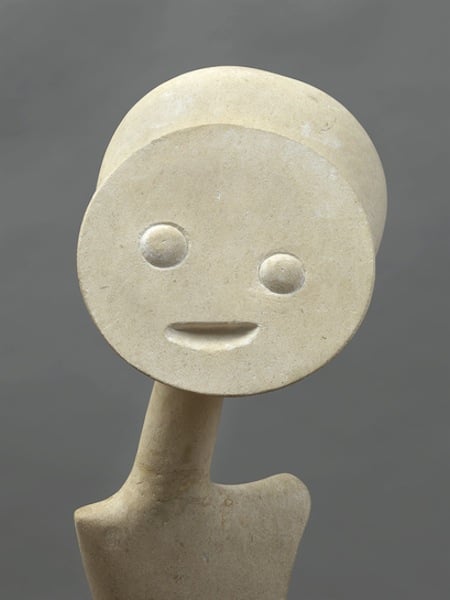
“There’s an amusement to all of them,” says Paul Kasmin of the charmingly elegant and quirky works in his eponymous gallery’s current exhibition, “Max Ernst Paramyths: Sculpture, 1934–1967. He says they are “uplifting, inspirational, and inventive, all at once.”
Ernst, a pioneering force of the Dada and Surrealism art movements, is making waves in New York this fall with 14 under-appreciated bronze and stone sculptures. It’s the first exhibition dedicated to the German artist’s sculpture since 1993.
Mazt Ernst’s studio at Huismes, in the Loire Valley (1961).
Photo: courtesy Jurgen pech/Werner Spies Archives.
“Every few years he would go and make a body of sculpture work and for him it was a great release,” Kasmin told artnet News in a phone conversation.
Kasmin sees a common thread between Ernst’s sculptures and his other work. “If you look at Surrealism it’s a lot to do with found objects and juxtapositions of materials,” he explained. That same inventiveness of materials can be seen in the sculptures, such as a pair of spoons forming the mouth of a tortoise, or the scallop shell bun of La Belle Allemande (1934–35).
Max Ernst, Apaisement, Huismes (1961).
Photo: courtesy Paul Kasmin Gallery.
“Sculpture is more pure play than painting,” Ernst once said to filmmaker Peter Schamoni. “With sculpture both hands play a role, just as it does when making love.”
“Max Ernst Paramyths: Sculpture, 1934–1967” at Paul Kasmin Gallery, New York (installation view).
Photo: courtesy Paul Kasmin Gallery.
Ernst’s love life is a tale unto itself: he married art dealer and collector Peggy Guggenheim, who helped him escape Germany on the eve of World War II, only leave her for one of her other artists, Dorothea Tanning. The divorce is a point of contention in Lisa Immordino-Vreeland’s documentary on the celebrated gallerist and collector, currently screening at at New York’s Film Society of Lincoln Center.
His life-size limestone statue inspired by Tanning, titled La Plus Belle, is the centerpiece of the Kasmin show, and has never been exhibited in the US before. Though Kasmin admits the work is the exhibition’s star, “the more I’m looking, the more I love the various different characters.”
Max Ernst, Bosse de nage,
Huismes (1959).
Photo: courtesy Paul Kasmin Gallery.
Though “an extremely lucky coincidence,” according to Kasmin, the Ernst show coincides with the Museum of Modern Art‘s exhibition of Pablo Picasso sculpture, which is also bringing new attention to a lesser-known facet of a famous artist’s practice.
For his part, Kasmin isn’t surprised that Ernst and Picasso are both finally getting their due as sculptors: “The two of them are great in every medium they work in.”
“Max Ernst Paramyths: Sculpture, 1934–1967” at Paul Kasmin Gallery, New York (installation view).
Photo: courtesy Paul Kasmin Gallery.
“Max Ernst Paramyths: Sculpture, 1934–1967” is on view at Paul Kasmin Gallery, 515 West 27th Street, New York, October 22–December 5, 2015.